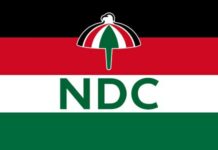A senior lecturer in Economics at the Kumasi Technical University (KsTU), Dr George Asumadu, has urged the government to exercise extreme caution in opening Ghana’s borders to foreign goods, warning that indiscriminate trade liberalisation could cripple local industries and deepen the country’s dependence on external economies.
“It is not everything that you have to open your borders for and allow an influx of goods, especially where you have the capacity to produce them internally. If you have that capacity, it is better to create opportunities for local entrepreneurs,” he told The Chronicle in an interview in Kumasi.

Dr. George Asumadu, who also doubles as the Twafohene of the Amakom Sub-Traditional Council, pointed to Asian economies, such as India and South Korea, as models of how deliberate long-term planning can transform struggling nations into global competitors.
“In the 1970s, India and Korea were struggling, but today they are competing in the automobile market with the likes of Japan and Germany. Why is it so? They came from somewhere and we can also do the same,” he stressed.
His call comes at a time when the world’s leading economies are themselves buckling under unprecedented debt burdens that raise questions about spill over effects on developing countries like Ghana.
The Global Debt Squeeze
Seven major economies – Canada, France, Italy, Japan, Spain, the United Kingdom and the United States – now carry debts larger than their annual economic output, according to the International Monetary Fund (IMF).
Most of this “G-7” group borrowed heavily to cushion their economies during the global financial crisis and again during the COVID-19 pandemic.

Japan has struggled with ballooning debt for nearly three decades, but the situation across the group is now compounded by high interest rates and volatile currencies.
Analysts warn that their economies are vulnerable to shocks reminiscent of the Asian and Russian financial crises of the 1990s, only on a much larger scale.
Dr. Asumadu noted that while debt is nothing new to developing countries, the G7’s fiscal struggles have global consequences. “Debt is not new to developing countries that already have their own debt problems. So if there is debt pertaining to the G-7, one would wonder why it should concern us. But it does, because of bilateral and multilateral trade relationships,” he said.
Why Ghana Should Worry
According to Dr Asumadu, debt crises in advanced economies have both external and internal implications for smaller economies.
“When it comes to debt, there are external and internal aspects. There are also unilateral, governmental, and private dimensions. All of these can affect us in one way or another,” he explained.
Ghana’s heavy reliance on imports—ranging from machinery to basic food commodities—makes it particularly exposed to external shocks. Any rise in global prices or tightening of financial markets translates directly into higher costs for consumers at home.
“Currently, Ghana imports about 70–80% of the goods it uses. This trend will not stop unless we deliberately invest in local production,” he cautioned.
He called for structural reforms that focus less on foreign inflows and more on domestic production capacity. “External financing often comes with conditions that may harm the country,” he warned.
Political Independence Without Economic Freedom
Dr. Asumadu lamented that although Ghana is universally acknowledged as politically independent, the country is yet to achieve true economic independence. “Everybody desires both political and economic independence. Ghana has political independence, but economic independence is still a battle. We need to restructure ourselves and know where we have comparative advantage,” he said.
That comparative advantage, in his view, lies in leveraging Ghana’s raw materials for value addition rather than exporting them in unprocessed form. He argued that infrastructure gaps, high production costs, and harsh loan conditions have left the country trapped in a cycle of exporting low-value cocoa, gold, and timber while importing high-value finished goods.
Ratings, Risks and Borrowing Costs
One area where the global debt crisis could hit hardest is access to international credit.
Asked if rising G-7 debt could push down borrowing costs for countries like Ghana, the Economics lecturer disagreed.
“The risks attached to loans determine the interest rate. That’s why some countries borrow at 3% while others pay as much as 15%. It depends on your fiscal space,” he explained.
He was critical of international credit rating agencies, arguing that they are often biased against developing nations.
“Most of these ratings are cooked. Developing countries are often presented as unattractive to foreign investment.”
The result, he said, is that Ghana faces stiffer borrowing terms even when its fundamentals are no worse than those of advanced economies.
The Inflation Trap
The Economics lecturer stressed that fiscal indiscipline at home is also fuelling Ghana’s challenges.
“Government spending must always match production. Any mismatch creates inflation, pressures and crises,” adding that poor fiscal targeting leads to inflationary pitfalls that weaken the exchange rate and force currency devaluation.
He proposed stricter budgetary discipline and a gradual, structured reduction in imports, especially of staples like rice.
“If it is rice, then we can set a five-year target to reduce imports by 100,000 metric tonnes, provided local farmers can guarantee production within that time,” he suggested.
Foreign Direct Investment and Competition
On the question of Foreign Direct Investment (FDI), Dr Asumadu noted that competition is intense and Ghana must create a more conducive environment.
“How do you compete with Dubai, given our infrastructure gap? If investors don’t come here, they will go elsewhere. So you need to make it attractive,” he said.
Incentives such as tax holidays and streamlined regulatory processes, he argued, could help Ghana position itself better in the global FDI market.
Importing Inflation
He further warned that austerity in advanced economies could affect Ghana through higher import prices, saying “if Canada faces wheat shortages, when Ghana imports flour, it is also importing inflation from there. That cost is transferred to consumers here.”
With Ghana being a net importer of consumer goods, such external shocks often show up quickly in rising food and transport costs.
Avoiding Another HIPC
Dr. George Asumadu also cautioned against slipping back into the Highly Indebted Poor Countries (HIPC) category, from which Ghana benefited debt relief in the early 2000s.
“Why should Ghana return to HIPC after 15 or 20 years? We are uncompetitive because we export low-value raw goods, but import high-value finished goods. Compare a tonne of cocoa with a tonne of laptops, the values are worlds apart.”
For him, the only sustainable solution is investment in technology, education and manpower development to reduce production costs and build resilience.
Building Internal Capacity
Ultimately, the Economics lecturer believes that Ghana’s survival depends on building strong internal capacity that can withstand external shocks.
“The shocks in the G7 always have repercussions on developing countries. Sometimes you cannot even plan your expenditure without budget support. That is why we must build internal capacity to withstand external spillovers.”
His message is clear: without deliberate structural reforms, Ghana risks importing not just goods but also crises from abroad.









